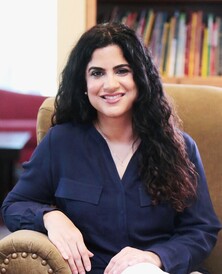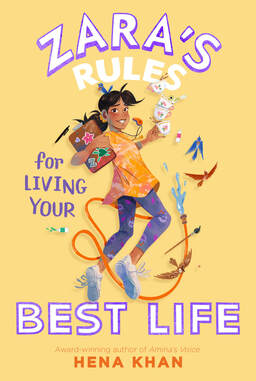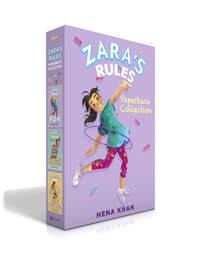|
Library day was a big deal in my family when I was a kid. We’d walk in with empty paper bags from the grocery store, I’d fill them up in the children’s section, and then carefully carry them out so they wouldn’t tear from the weight. I still remember how amazing it was to go home feeling rich in unread stories. I loaded those bags with all sorts of books, but my favorites were by Beverly Cleary and Judy Blume, like so many of my peers. Back in my room, I’d spend countless hours absorbed in the lives of their characters, wishing that I was friends with them, playing the same games, living in their neighborhoods, and going to their schools. Their daily struggles and challenges became my own, along with their triumphs and victories. I savored the moments that I was transported into their worlds before I was jolted back into my own. It wasn’t that my life was terrible in any way. It just felt so . . . ordinary. Even as a Pakistani-American Muslim child of immigrants growing up in a diverse suburb of Washington, DC, who felt different than those around me, I considered myself far from special. My life was divided between school friends, neighborhood friends, and family friends, with little overlap. I didn’t vacation much, go to sleep away camp, have a dog, take piano lessons, or any of the other things that seemed to make other kids’ lives more exciting than mine. Instead, I played make-believe games about running away, built forts, had a toolshed converted into a playhouse, and painted pet rocks when I wasn’t reading. I also ate kofta and roti for dinner, heard Urdu news playing on the television, and went to the Islamic center on the weekends. As a child writer (which I was, although I never dared to call myself that!) I filled pages with tales about pirates, intergalactic adventures, knights and castles, and stories inspired by popular television shows involving superheroes and stunt actors. I didn’t write about my own life, my neighborhood, or the things that made up my unexciting days in my unexceptional life. And the idea of writing about my family? No way! Who would be able to relate to my experiences? Who would understand the way my family worked, along with our traditions, foods, language and more? We weren’t like the families of Ramona or Margaret, or the other kids I read about. Coming from that mindset, it still amazes me that all these years later I’m writing about a Pakistani American Muslim girl in my Zara’s Rules series. The books mostly take place in her home and neighborhood, with a diverse group of neighbors based on my own, and an extended family inspired by mine. But what I understand now as an adult is that what we see as small or mundane moments now, feel a lot bigger when you’re a kid, and that there is so much beauty, fun, discovery, and growing in those daily struggles and victories I adored reading about when I was younger—and love to write about now. When I started my children’s writing career over twenty years ago, beginning as a writer-for-hire for various series, then making my way over to trade publishing and starting with picture books, I still couldn’t let myself dream that I would ever write something like Zara’s Rules. It’s a series that celebrates being a kid, creativity, and friendship. It’s all about antics: trying to break a Guinness World Record, creating a wagon-based business to earn needed funds, saving a staycation by turning into a camp, and more. There are failures and triumphs, all on a kid-sized scale. But it’s also about an ordinary girl like me and my kids. A girl who goes on bike rides, plays kickball, and watches her little brother, and also hears Urdu, eats paratha, and celebrates Eid. She is relatable and charming in every way because of who she is, not in spite of it. I owe a tremendous debt to Beverly Cleary and Judy Blume, for teaching me that the lives of ordinary girls are fascinating to other kids, and for showing me that families and friendship can be messy and complicated but no less wonderful. I didn’t need for the characters I read about to be exactly like me in order to wish I was their friend, I just needed them to feel real. And it brings me endless joy to know that readers are connecting with my Zara and wishing they lived on her street as they get to escape into her world for a little while, one book at a time. Hena Khan is a Pakistani American writer. She is the author of the middle grade novels Amina’s Voice, Amina’s Song, More to the Story, Drawing Deena, and the Zara’s Rules series and picture books Golden Domes and Silver Lanterns, Under My Hijab, and It’s Ramadan, Curious George, among others. Hena lives in her hometown of Rockville, Maryland, with her family. You can learn more about Hena and her books by visiting her website at HenaKhan.com or connecting with her @HenaKhanBooks.
Headshot photo credit: Havar Espedal Comments are closed.
|
Archives
July 2024
Categories
All
|



 RSS Feed
RSS Feed



